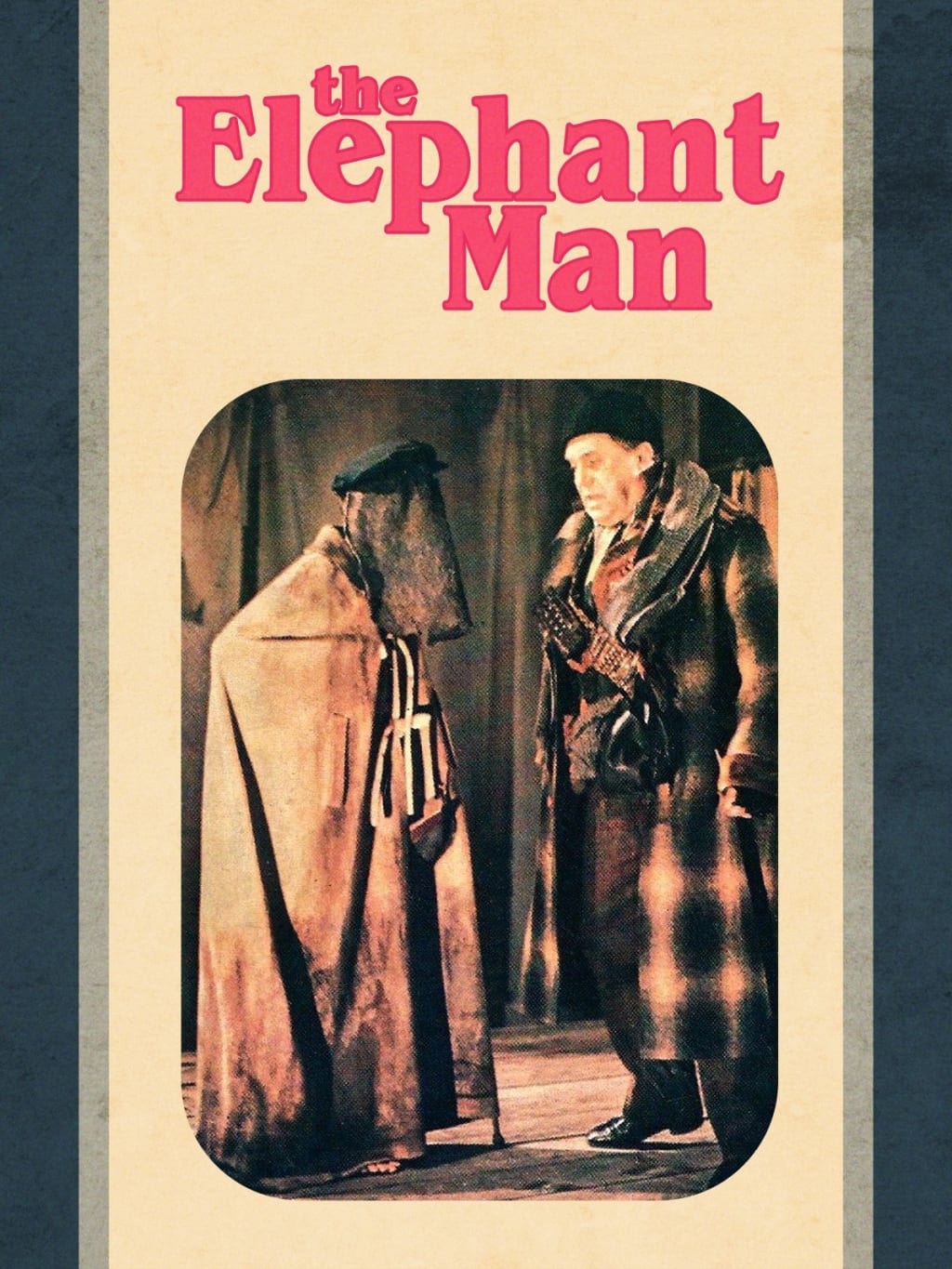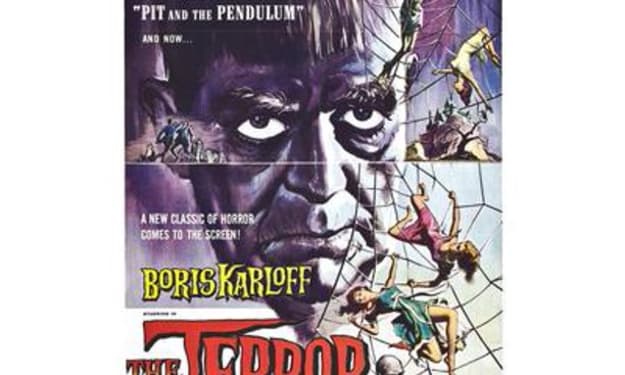The Elephant Man (The Stage Play)
(1982)

When I was a child I threw the tantrum of all tantrums because I didn't want to watch the stage play of The Elephant Man on television. I think the year may have been 1982.
My parents wanted to watch the damn thing and insisted. I was put to bed. The Elephant Man and I have had a curious relationship ever since.
I wrote my first novel, Joseph, based on the story of....the Elephant Man. Also, Jack the Ripper, but the two walk rather hand in hand, wouldn't you agree? As Patricia Cornwall put it: "Each was what the other was from the inside out." Not an exact quote, but turn the ugliness of Jack the Ripper outward, and you might have a monstrous image, like that of Joseph "John" Merrick. At any rate, they lived at the same time, in the same city, in the same district. Contemporaries, they were.
I later saw David Lynch's film The Elephant Man from 1980 (which I remember as a child being advertised on HBO), but nothing had as much impact on me as the ABC "Theater of the Week" production starring Kevin Conway as Dr. Treves, and Philip Anglim as "John" Merrick (the name is erroneous of course; his actual name was Joseph Carey Merrick). The weird, warbling diction of the actor, over-enunciating everything as a man with a deformed jaw might do; his nudity, save for a loin cloth, Christ-like; and, of course, the strange, frightening hood with its single, hideous eyehole and weird peaked cap, as well as the shambling gate beneath the cloak--well, that was all a bit much for a six-year-old.
I knew he was coming. I well remember visiting a park with my other, a rundown place in a poor neighborhood. But it didn't matter, at least not that day. I remember the sun shining, and I sat down, sweaty, and there was a TV Guide with a handsome man in a Victorian suit that looked like he could star in one of my mother's soap operas.
"Who's that?" I asked, innocently enough.
"Oh, it's the Elephant Man. It's coming on TV."
A curious name I thought. I asked, "The Elephant Man. Who's he?"
She didn't seem to know how to explain to me, so she said something along the lines of, "He was very ugly, and everyone was mean to him."
Now I was really confused. The picture on the front of the TV Guide was not of an ugly man. Not ugly at all. I began to feel uneasy. Was there something I wasn't understanding? Was there perhaps something about him that I couldn't see that made him just "bad"? Was he some sort of devil?
The stage play of The Elephant Man is both bleak and tragic, but that isn't rather the point. The TV version has eerie stretches, when Treves perambulates dark London streets, his voiceover making it seem as if he were in a dream. Treves, coming across the canvas portrait of the Elephant Man, meets the exhibitor, Ross, who displays John Merrick firstly as a shadow, the tall Anglim disrobing almost like a boxer.
Treves, happy or unnerved, or at least not disappointed that this was no "mass of paper mache," pays Ross, who then comments that Merrick was abandoned by a cruel bitch of a mother in a Leicester workhouse ("Well, couldn't bear the sight of him...you could understand.") and gladly lets the good doctor exhibit Merrick before the London Pathological Society. Here, we see real images of Joseph Carey Merrick, and Anglim enters to disrobe, again wearing only a loin cloth.
Ross (played here by the late Christopher Hewett, who starred in the American sitcom "Mr. Belvedere") takes Merrick to Belgium, where he meets two strange characters, fellow "freaks", the microcephalic female twins who seem incapable of coherent speech. (We'll be seeing both of them again.) A policeman abuses Merrick, and Ross robs him, sending him packing, back to London, to Piccadilly Station, and the waiting arms of Treves.
Mobbed at the train station by the curious, Merrick wails a plaintive "Help me!" as Treves arrives, and it is only a step or two more before Merrick is installed in London Hospital, at Bedstead Square, the stage being set to look like a bricked-up set of basement rooms; very dark, stark, and befitting the mood of the play. Merrick then becomes the focal point for comic observations about the stringent, hypocritical morality of the Victorians. When an orderly is fired for peeping at Merrick, though forbidden, Merrick observes comically, "If all those that stared at me had been sacked, there'd be whole towns out of work."
Merrick, the ultimate outsider, is in fact uniquely suited to comment on the world in which the comfortable, respected, bourgeois Treves dwells. He cannot, for instance, fathom what Treves is trying to "educate" him about when he explains, very patiently, that "rules make us happy, John. Why do rules make us happy?" Instead, Merrick tells him of the workhouse, where the rules were applied with brutal force. "Boom, boom, boom, they hit you if the floor is dirty...it's always dirty."
Women, of course, obsess Merrick. Treves as well. To that end, he tries to hire a special nurse to care for Merrick ("It is not a part of their duties, and they simply won't do it," he says of the regular hospital staff). Miss Sandwich (Charlotte Moore) is quite arrogantly self-assured and proud of her missionary work taking care of lepers. However, when she sights Merrick, she runs from the room screaming.
It is only the coy, sly, and very good Madge Kendal (Penny Fuller), who can tolerate Merrick, and they begin a relationship that is as confusing as it is charming.
Kendall firstly reveals Treves for his Victorian sensibilities and repression, making him embarrassed by a description of Merrick's undeformed genitalia. ("There's no bone in it!" he says cheerfully, before crumpling in humiliation. "I'm so embarrassed!" he says. Mrs. Kendall replies, "Then he really must be lonely"; implying that Treves cannot, because of the repression of the Victorian class structure, relate to Merrick on any deeply personal level.)
Sexuality is a no-no for Merrick, as Madge Kendal, who becomes sister, surrogate mother, boon companion, and fantasy wife bares her naked breasts to an aroused Merrick as Treves walks in.
"Don't you know what you are?" Treves asks Merrick, letting the mask of his reserved exterior slip, revealing the Victorian cruelty of class, race, and sexual distinction--Merrick transcends all of these categories as something entirely different, almost alien of course; however, it is the same sentiment. Treves has tried to dress "His" man up in a fine suit of clothing, with adequate toys and visitors aplenty, high-class visitors, in which Merrick can live a sort of fantasy life that is brutally stripped away, suddenly, by Treves' shocking comment. Why does he do this?
Treves has never really thought of Merrick, it seems, as anything OTHER than "the Elephant Man." That's what his callous remark proves: he has simply tried to stuff John Merrick in a fine suit, parade him about in front of a public brimming full of wonder and phony sentimentality; and has, in essence, become yet another "freak exhibitor," not much different than the hated Ross.
There is a strange fantasy episode, near the climax of the picture, wherein Merrick and Treves change places. Merrick strides normally, tall, handsome, pointing a wicker cane at Treves as he slumbers dreamily in a chair, and describes Treves' repression, his need to dominate, his inability to relate to human beings on a meaningful level; his neurosis being described as vulgarly as John Merrick's deformity. Whether this is Treves' or Merrick's dream, is never made quite clear.
(Anglim's amazing performance should be noted here, twisting his perfect body into a pretzel shape, his weird, over-enunciated, sometimes clicking speech plaintive, and pitiful; he is childlike and haunting. Conway as Treves is a typical Victorian, socially and sexually repressed, he seems confined yet content; beneath, however, there is lurking self-doubt that he wants to tamp below the surface of his personality.)
The death of Merrick (Treves says to himself when Merrick is having issues with the fact that Treves has sent Kendal away, "Because I don't want her to be here when you die.") is seen from above as if God is watching down on him. The two female microcephalics ("Pinheads" in the offensive, politically-incorrect jargon of the carnival) make a reappearance, singing a variation of the "Belgium Congo" song they sang at the beginning of the play. It is quite a little number:
"We are the Queens of the Cosmos,
Beautiful darkness empire.
Darkness, darkness, light's true flower,
This is eternity's finest hour.
Sleep like the ones you've learned to admire,
Be like your mother, be like your sire.
The actual Joseph Merrick's death, at the age of twenty-five, may very well have been suicide. He laid down to sleep, "like other people," a wish he often had, as he had to sleep with his great head resting on his knees. Treves and Carr Gomm go down to Merrick's dingy, dark basement room at London Hospital to claim his possessions. Carr Gomm reads a letter to the Times, which he has composed about Merrick's death. Treves leaves as if to say, "that's it!" but then returns. "Mr. Carr Gomm, there's just one more thing."
"What?"
"Oh, well, never mind. I'm not sure about any of it."
The play ends. The audience realizes that Treves had never managed to penetrate the soul of John Merrick, and was still confused as to what he was, what he signified, and what Treves himself wanted from the relationship. It was the cold, Victorian exterior shining through the human skin.
And the skin is, of course, an exceptionally large part of the focus of the play: the normal outer layer of Treves' emotional skin is, though conventionally perfect, revealed to be as diseased as Merrick's. It hides an interior that has an often unsympathetic, icy reservation. Why does he save John Merrick's life? Is it out of compassion, experimental curiosity, or personal gain? The audience is left with the ambiguity of his moral choice. Merrick, for instance, referring to the nude breasts of Madge Kendal and the fact that Treves performs surgery on nude women, asks innocently, at one point, "Is it okay to see them naked if you cut them up afterward?" To which Treves replies, "My God, you make me sound like Jack the Ripper!" However, perhaps Treves himself was wondering at what level of emotional detachment, repression, and hypocrisy was he functioning.
The stage play The Elephant Man changed my infant psyche. They must have played and replayed the damn thing on cable a hundred times in those days because I remember wandering around the living room watching it again and again: the strange jaunts through a darkened, staged Victorian "London," the voiceovers of Treves, the weird, brooding, silences and thick imitation fog, and the whole thing had an effect on me in some way I am still paying for, and can't quite describe. That's a heavy burden to put on an artist, whether he's the one being stared at, like poor John Merrick (or, rather, the artist's work I hope), or the one who cannot take his eyes off of the spectacle of ugliness and pain twisted before his unbelieving eyes.
The Elephant Man: The Stage Play can be viewed on YouTube.
each other ever since.
About the Creator
Tom Baker
Author of Haunted Indianapolis, Indiana Ghost Folklore, Midwest Maniacs, Midwest UFOs and Beyond, Scary Urban Legends, 50 Famous Fables and Folk Tales, and Notorious Crimes of the Upper Midwest.: http://tombakerbooks.weebly.com
Enjoyed the story? Support the Creator.
Subscribe for free to receive all their stories in your feed. You could also pledge your support or give them a one-off tip, letting them know you appreciate their work.






Comments (1)
Very Good Tom